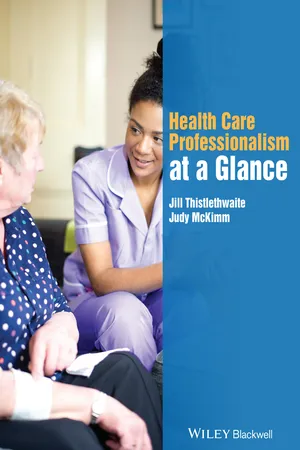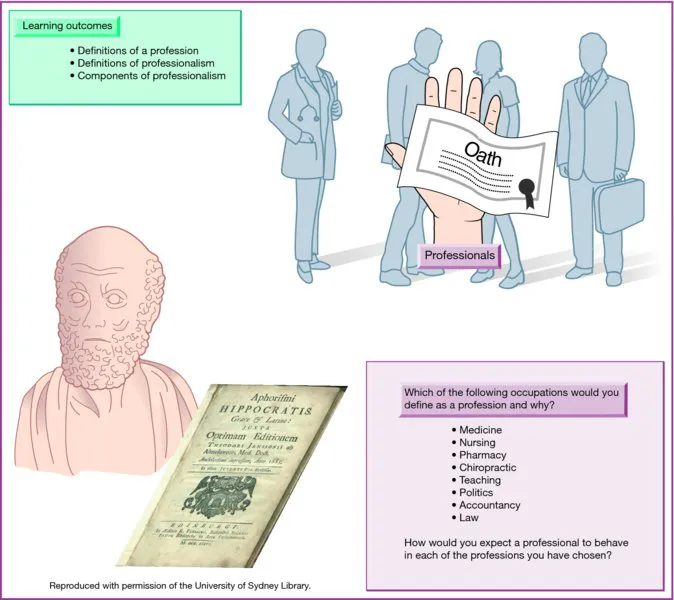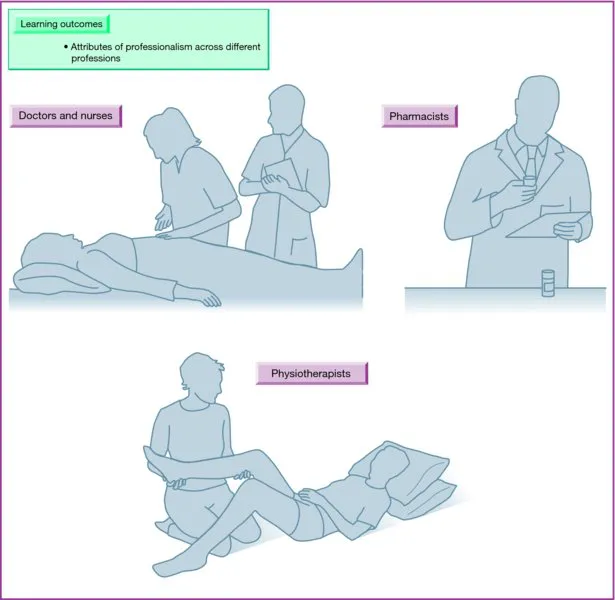
Health Care Professionalism at a Glance
Jill Thistlethwaite, Judy McKimm
- English
- ePUB (mobile friendly)
- Available on iOS & Android
Health Care Professionalism at a Glance
Jill Thistlethwaite, Judy McKimm
About This Book
Health Care Professionalism at a Glance offers accessible coverage of an increasingly important aspect of medical and health professional education. This concise text includes how to identify and develop professional behaviours, how they are assessed, and how to challenge unprofessional behaviours. Health Care Professionalism at a Glance:
•Provides a user-friendly and thought provoking overview of health care professionalism
•Introduces the main topics, key definitions and explores aspects relevant to learners and novice professionals
•Considers fundamental features of professionalism that students are expected to acquire as well as how they are taught, learned and assessed
•Includes summary boxes that highlight important points, reflection points, clinical cases and suggested further reading
•Includes references relevant to different countries' accrediting bodies This important new book will assist students in understanding the nature of professionalism, its assessment, and the implications for professional practice.
Frequently asked questions
Information
Part 1
Professionalism in context
- 1 What is professionalism?
- 2 Health professionalism
- 3 Brief history of the profession of medicine
- 4 Becoming a professional
- 5 Role of regulatory and professional bodies
- 6 Fitness to practise and health for practice
- 7 Revalidation and remediation
- 8 Social media and the professional
CHAPTER 1
What is professionalism?

The bond between a man and his profession is similar to that which ties him to his country; it is just as complex, often ambivalent, and in general it is understood completely only when it is broken: by exile or emigration in the case of one’s country, by retirement in the case of a trade or profession. (Primo Levi, chemist and writer, in: Other People’s Trades 1985, trans. 1989)
Definitions
- A skill set based on specialist knowledge
- Provision of training and education
- Means of testing for competence
- Organisation of members
- Adherence to a code of conduct
- The provision of an altruistic service not just for financial reward (Johnson, 1972)
A profession is ‘an occupation whose core element is work based upon the mastery of a complex body of knowledge and skills. It is a vocation in which knowledge of some department of science or learning or the practice of an art founded upon it is used in the service of others. Its members are governed by codes of ethics and profess a commitment to competence, integrity and morality, altruism and the promotion of the common good within their domain’ (Cruess et al., 2004).
‘…a man who can do his job when he doesn’t feel like it. An amateur is a man who can’t do his job when he does feel like it.’ James Agate (1877—1947), British diarist and critic ‘a reflective practitioner who acts ethically’. Hilton and Slotnick (2005)
Professionalism courses
- Ethics and the duties of a health professional
- The law applied to health professional practice
- The role of the regulatory body (e.g. for medicine — the General Medical Council in the United Kingdom and the Australian Health Professional Regulatory Authority and the medical boards in Australia; for nursing — the Nursing and Midwifery Council in the United Kingdom and the Nursing and Midwifery Board in Australia)
- Communication (not only with patients but also with colleagues/other health professionals; and not only oral but also written and online)
- Teamwork and collaboration
- Self-care
- Cultural awareness and cultural competence
- Reflective practice
- Patient safety
- Leadership
CHAPTER 2
Health professionalism

Medicine
- Primacy of patient welfare
- Primacy of patient autonomy
- Principle of social justice
- Professional competence
- Honesty with patients
- Patient confidentiality
- Maintaining appropriate relationships with patients
- Improving quality of care
- Improving access to care
- Just distribution of resources
- Scientific knowledge
- Maintaining trust by managing conflicts of interest
- Professional responsibilities